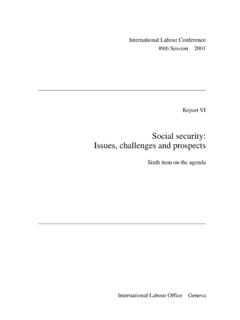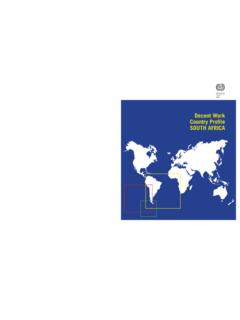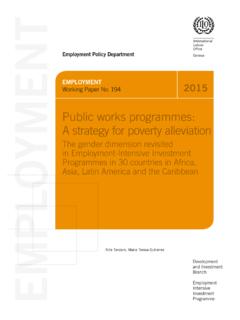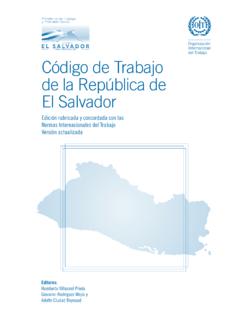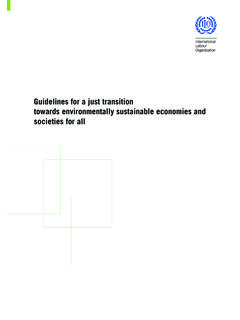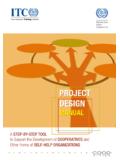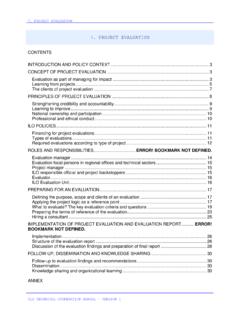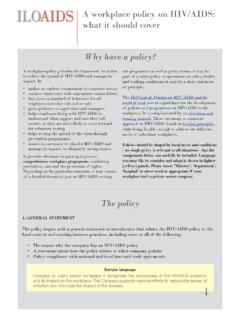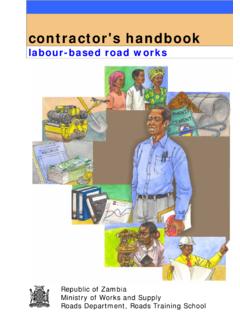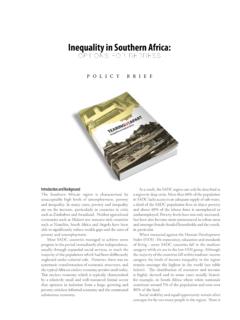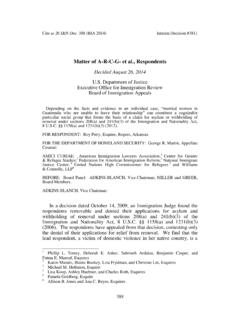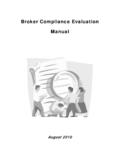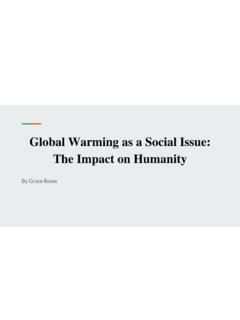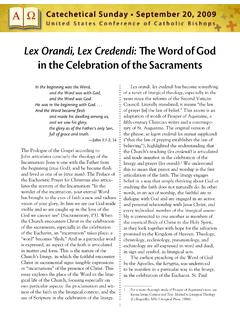Transcription of Indonesian Labour Law - Act 13 of 2003
1 1 NATLEX database ISN 64764 Unofficial translation prepared by ILO Jakarta. This translation is intended for information purposes only and does not substitute consultation of the authoritative text. Copyright 2004 International Labour Organization. STATE GAZETTE OF THE REPUBLIC OF INDONESIA No. 39, 2003 MANPOWER. Labour . Work Agreement. Employment Relations. Inspection. Termination of Employment. Workers Institute. Wages. Central Government. Regional Governments. (Explanation in the Supplement to the State Gazette of the State of the Republic of Indonesia Number 4279.) ACT OF THE REPUBLIC OF INDONESIA NUMBER 13 YEAR 2003 CONCERNING MANPOWER WITH THE GRACE OF THE ONE AND ONLY GOD, THE PRESIDENT OF THE REPUBLIC OF INDONESIA, Considering: a. That Indonesia s national development shall be implemented within the framework of building Indonesians as fully-integrated human beings and of building the whole Indonesian society in order to realize a society in which there shall be welfare, justice and prosperity based on equity both materially and spiritually with the Pancasila and the 1945 Constitution at its foundation.
2 B. That in the implementation of national development, workers have a very important role and position as actors of development as well as the goal of development itself; c. That in accordance with the role and position of workers, manpower development is required to enhance the quality of workers as well as their role and participation in national development and in improving protection for workers and their families in respect to human dignity and values; d. That protection of workers is intended to safeguard the fundamental rights of workers and to secure the implementation of equal opportunity and equal treatment without discrimination on whatever basis in order to realize the welfare of workers/ labourers and their family by continuing to observe the development of progress made by the world of business; e. That several acts on manpower are considered no longer relevant to the need and demand of manpower development and hence, need to be abolished and/or revoked; f.
3 That based on the considerations as referred to under points a, b, c, d and e, it is necessary to establish an Act on Manpower. 2 In view of: Article 5 Subsection (1), Article 20 Subsection (2), Article 27 Subsection (2), Article 28 and Article 33 Subsection (1) of the 1945 Constitution. With the joint approval between THE HOUSE OF REPRESENTATIVES OF THE REPUBLIC OF INDONESIA AND THE PRESIDENT OF THE REPUBLIC OF INDONESIA DECIDES: To establish: ACT CONCERNING MANPOWER [ Indonesian Labour LAW] CHAPTER ONE GENERAL DEFINITIONS Article 1 Under this act, the following definitions shall apply: 1. Manpower affairs or Labour (ketenagakerjaan) refer to every matter that is related to people who are needed or available for a job (tenaga kerja) before, during and after their employment. [Translator s note: the word ketenagakerjaan means Labour , which can be referred to in a narrow sense as the services performed by workers for wages, or in the broadest sense of the term as human activity that provides the goods or services in an economy, which includes the activity of not just workers but also enterprises and the government as well.]
4 However, the word ketenagakerjaan may also mean every matter that is related to manpower or workers and therefore, the phrase manpower affairs is here also used in the translation.] 2. People available for a job or person available for a job (tenaga kerja) is every individual or person who is able to work in order to produce goods and/ or services either to fulfill his or her own needs or to fulfill the needs of the society. 3. A worker (pekerja) / labourer (buruh) is every person who works for a wage or other forms of remuneration. 4. An employer (pemberi kerja) shall refer to individuals, entrepreneurs, legal entities, or other bodies that employ manpower by paying them wages or other forms of remuneration. 5. An entrepreneur (pengusaha) shall be defined as: a. An individual [proprietor], a partnership or a legal body that runs an enterprise that he or she or it owns; b.
5 An individual, a partnership or a legal body that independently runs an enterprise that does not belong to him, her or it. 3c. An individual, a partnership or a legal body that is situated in Indonesia but represents an enterprise as referred to under point a and point b that has its seat/ base outside the territory of Indonesia. 6. An enterprise (perusahaan) shall refer to a. Every form of business [undertaking], which is either a legal body or not, which is owned by an individual, a partnership or a legal body that is either privately owned or state owned, which employs workers/ labourers by paying them wages or other forms of remuneration; b. Social undertakings and other undertakings with officials in charge and which employ people by paying them wages or other forms of remuneration. 7. Manpower planning (perencanaan tenaga kerja) shall refer to the process of making a manpower plan systematically that is used as a basis and reference for formulating the policy, strategy and implementation of a sustainable manpower development program.
6 8. Manpower information (informasi ketenagakerjaan) shall refer to a group, a set or series and an analysis of data in the form of processed numbers, texts and documents that have specific meanings, values and messages concerning Labour . 9. Job training (pelatihan kerja) shall refer to the whole activities of providing [workers or potential workers with, and paving the way for them to] acquire, enhance and develop job competence, productivity, discipline, work attitude and ethics until a [desired] level of skills and expertise that match the grade and qualifications required for a position or a job is reached. 10. Job competence or competency (kompetensi kerja) shall refer to the capability of each individual that covers aspects of knowledge, skills and work attitude which accords with prescribed standards. 11. Apprenticeship (pemagangan) shall be defined as part of a job training system that integrates training at a training institute with working directly under the tutelage and supervision of an instructor or a more experienced worker/ labourer in the process of producing goods and/ or services in an enterprise in order to master a certain skill or trade.
7 12. Job placement service (pelayanan penempatan tenaga kerja) shall be defined as an activity aimed at matching up manpower with employers so that manpower get jobs that are suitable to their talents, interest and capability and employers get the manpower they need. 13. People of foreign citizenship available for a job (tenaga kerja asing) shall refer to visa holders of foreign citizenship [who come to Indonesia] with the intention of finding employment within Indonesia s territory. 14. An [individual] work agreement (perjanjian kerja) shall be defined as an agreement made between a worker/ labourer and an entrepreneur or an employer. The agreement specifies work requirements, rights and obligations of both sides. 15. An employment relation or relationship (hubungan kerja) shall be defined as a relationship between an entrepreneur and a worker/ labourer based on a work/ employment agreement, which deals with aspects relating to the job [that the worker has to do], the worker s wage, and orders and instructions [that the worker has to carry out].
8 16. An industrial relation (Hubungan Industrial) shall be defined as a system of relations that take shape among actors in the process of producing goods and/or services, which consist of employers, workers/ labourers and the government, which is based on the values of the Pancasila and the 1945 Constitution of the Republic of Indonesia. 4 17. A trade union (serikat pekerja) / Labour union (serikat buruh) shall be defined as an organization that is formed [established] from, by and for workers/ labourers either within an enterprise or outside of an enterprise, which is free, open, independent, democratic, and responsible in order to strive for, defend and protect the rights and interests of the worker/ labourer and increase the welfare of the worker/ labourer and their families. 18. A bipartite cooperation forum (forum kerjasama bipartit) shall refer to a communication and consultation forum on matters pertaining to industrial relations in an enterprise whose members consist of entrepreneurs and trade/ Labour unions that have been registered at a government agency responsible for manpower affairs or workers/ labourers representatives (unsur pekerja).
9 19. A tripartite cooperation institute (lembaga kerjasama tripartit) shall refer to a communication, consultation and deliberation forum on manpower issues (problems) whose members consist of representatives from entrepreneurs organizations, workers/ labourers organizations and the government. 20. Enterprise rules and regulations (peraturan perusahaan) shall refer to [a set of] rules and regulations made in writing by an entrepreneur that specify work requirements and the enterprise s discipline and rule of conduct. 21. A collective work agreement (perjanjian kerja bersama) is an agreement resulted from negotiations between a trade/ Labour union or several trade/ Labour unions registered at a government agency responsible for manpower affairs and an entrepreneur or several entrepreneurs or an association of entrepreneurs. The agreement shall specify work requirements, rights and obligations of both sides.
10 22. An industrial relations dispute (perselisihan hubungan industrial) is a difference of opinion that results in a conflict between an entrepreneur or an association of entrepreneurs and a worker/ labourer or a trade/ Labour union because of dispute over rights, interests and termination of employment and dispute between a trade/ Labour union and another trade/ Labour union in the same enterprise. 23. A strike (mogok kerja) is a collective action of workers/ labourers, which is planned and carried out by a trade/ Labour union to stop or slower work. 24. A lockout (penutupan perusahaan) is the entrepreneur s action of refusing the worker/ labourer in whole or in part to perform work. 25. The severance of an employment relationship (pemutusan hubungan kerja) is termination of employment relationship because of a certain thing that results in the coming of an end of the rights and obligations of both the worker/ labourer and the entrepreneur.
